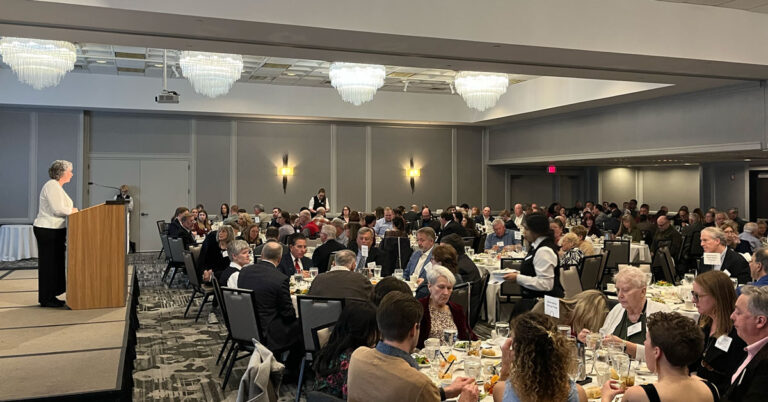The Capitol Report, produced by WisPolitics.com — a nonpartisan, Madison-based news service that specializes in coverage of government and politics — provides a weekly analysis of issues being
debated in Wisconsin state government. It is underwritten by the WNA and produced exclusively for its members. WisPolitics President Jeff Mayers is a former editor and reporter for the Associated Press and a former political writer for the Wisconsin State Journal. The WisPolitics logo can be downloaded here.
Editor’s note: This column is provided to Wisconsin Newspaper Association members by WisPolitics.com. Proper attribution to WisPolitics.com is appreciated. Also, please publish the tagline that is included at the end of the column.
Is a ‘blue wave’ coming?
First, an unexpected Democratic victory in western Wisconsin’s 10th Senate District, a seat that had long been in Republican hands.
Then, the virtual Democratic candidate in the officially non-partisan Supreme Court race trounced the candidate with $400,000 in backing from the state Republican Party.
And in June, special elections in two legislative seats could add to Democrats’ momentum in this big election year. In November, GOP Gov. Scott Walker and Democratic U.S. Sen. Tammy Baldwin will stand for re-election.
Some Republicans are adamant it makes no sense to have special elections in June to fill two legislative seats vacant since December, considering they’ll both be on the ballot this coming November. But insiders say the law wasn’t on the GOP’s side, and now Republicans have to hope the races in the 1st Senate District in northeastern Wisconsin and 42nd Assembly District in south central Wisconsin don’t turn into another data point suggesting a Democratic wave this fall.
When Walker appointed state Sen. Frank Lasee, R-De Pere, and state Rep. Keith Ripp, R-Lodi, to his administration, he had no plans to call special elections because the Legislature would adjourn before the seats could be filled. But as Walker resisted pressure from Dems to call the elections – particularly after the GOP loss in the 10th Senate District – the National Democratic Redistricting Committee went to court to force the issue.
Initially, Republicans blew off a Dane County judge’s order for Walker to call the special elections as the work of a liberal activist. But after the state Department of Justice’s arguments fell on deaf ears with a different Dane County judge and the conservative 2nd District Court of Appeals, the administration dropped its legal challenge and GOP legislative leaders dropped plans for a bill to undermine the court decision. To some, it was a sign the DOJ arguments were on shaky legal ground and that the optics were bad for Republicans.
After declining a trip to the state Supreme Court, Walker issued the special election call for June 12.
Some analysts say that embarrassing episode contributed to the Republicans’ big loss on April 3.
Other pundits say bigger forces were at work – Democratic enthusiasm to fight back in Wisconsin and the nation after Hillary Clinton lost to Donald Trump in 2016.
Milwaukee County Judge Rebecca Dallet’s big margin of victory – 56 percent to 44 percent – over Sauk County Judge Michael Screnock for a 10-year term on the high court surprised many observers, considering liberals hadn’t won an open seat since 1995.
A WisPolitics.com analysis showed turnout was up in the heavily Republican counties around Milwaukee compared to 2015, but not at the level a conservative needed to win statewide.
Meanwhile, Dallet ran up big numbers in counties such as Dane, Eau Claire and La Crosse on top of outperforming typical Dem marks in areas that went the GOP’s way in 2016.
The results also underscore Democrats’ strength in Dane County and its growing role in statewide contests: Dallet won the county by 82,484 votes. That was more than double the 40,898-vote edge Screnock had in the GOP-dominated WOW counties around Milwaukee – Waukesha, Ozaukee and Washington.
What will it mean for races this fall?
Eric Holder’s National Democratic Redistricting Committee touted its more than $500,000 investment in the state Supreme Court race, including partnerships with a series of groups that did voter contact ahead of the election.
Kelly Ward, the NDRC’s executive director, said the Wisconsin Supreme Court race can be a model for Dems across the country: a strong candidate, investing in organizations on the ground and an engaged electorate.
“That enthusiasm and that model is what you’re going to see carry Democrats to a lot of victories this fall,” she said.
Walker, in turn, warned Republicans that a “blue wave” could be coming to Wisconsin and urged them to tout their accomplishments.
He pointed to record-low unemployment, increased education spending, and lower taxes, among other things.
“I think if we get that story out people are going to respond,” Walker said. “I think people want to vote for something, not against something.”
The Capitol Report is written by editorial staff at WisPolitics.com, a nonpartisan, Madison-based news service that specializes in coverage of government and politics, and is distributed for publication by members of the Wisconsin Newspaper Association.
Copyright © WisPolitics.com



